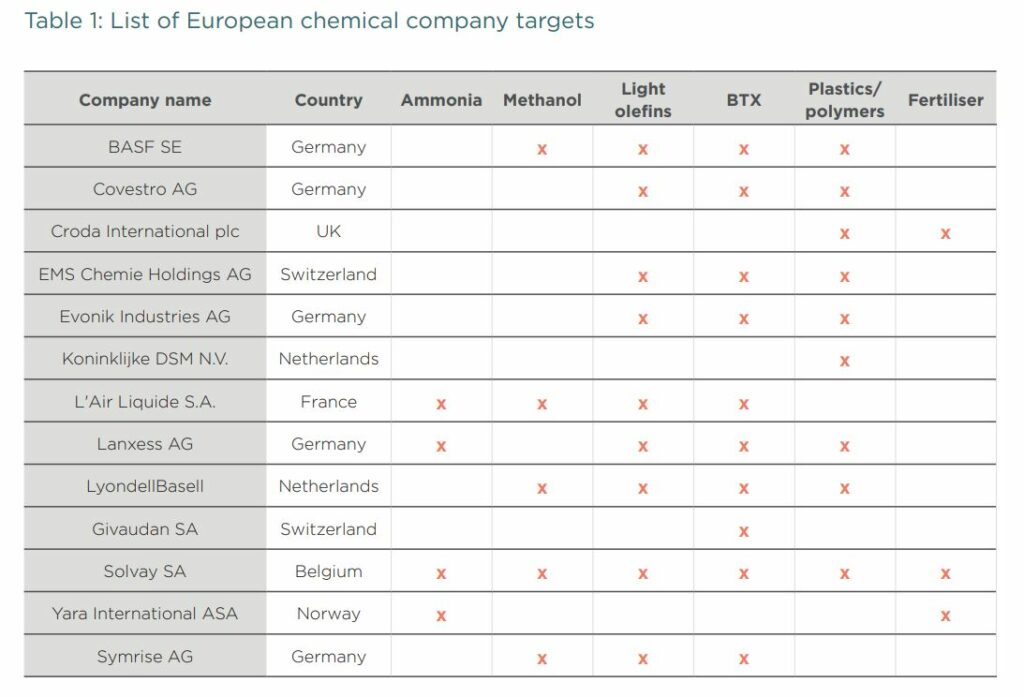A network of investors representing $3.2trn has formed to target engagement with companies in the chemicals sector, calling for the industry to decarbonise by 2050.
Responsible for more than 5.8% of global greenhouse gas emissions, the chemicals sector has had little engagement from shareholders, investment charity ShareAction has said, for example comprising just seven of Climate Action 100+‘s focus list of 167 companies.
The group includes EOS at Federated Hermes, Barrow Cadbury Trust, EdenTree Investment Management, Jesuits in Britain, NN Investment Partners, and Sarasin & Partners.
Joanne Beatty, engager and chemicals sector lead, EOS at Federated Hermes, said: “2021 will be seen as a tipping point for investor engagement on climate action, with greater focus shifting towards neglected sectors such as chemicals, which is vital to accelerate company progress on the climate transition.”
A new ShareAction report, Slow reactions: Chemical companies must transform in a low carbon world, shows the transition is possible – by doing things such as electrifying energy processes using renewables and replacing fossil feedstock with green hydrogen and green methanol – and economically viable, with renewables and green hydrogen set to undercut the price of fossil fuels by 2030.
Despite this, however, there are few transition plans, the report said, and those that have been proposed by the chemicals industry, such as blue hydrogen, carbon capture and storage and biomass, are not suitable.
The report therefore urges investors to up their engagement with chemicals companies and includes questions to ask, such as:
For ammonia and methanol companies:
- Does the company have a credible plan to replace fossil fuel feedstocks with emissions-free alternatives such as green hydrogen by 2050 at the latest?
- Does the company have a credible plan to use 100% renewable energy for energy needs (steam, heat, compression, cooling etc.) by 2050 at the latest?
- Where CO2 is needed, does the company have a credible plan to ensure this CO2 is carbon neutral by 2050 at the latest?
For high-value chemicals:
- Does the company have a credible plan to replace current production processes for high-value chemicals with net zero emission processes, such as methanol-to-olefins (MTO) and methanol-to[1]aromatics (MTA), by 2050 at the latest?
- Does the company have a credible plan to use 100% renewable energy for energy needs (e.g. for the MTO/MTA processes and any other energy consumption), by 2050 at the latest?
End products and Scope 3:
- Does the company have a credible strategy to mitigate all its Scope 3 emissions by 2050 at the latest?
- Where the company is involved in the value chain for fertilisers (e.g. producing primary chemicals such as ammonia, or being a direct fertiliser producer), does the company have credible plans to mitigate emissions at all stages of the product’s life cycle by 2050 at the latest?
- Where the company is involved in the value chain for plastics (e.g. producing primary chemicals such as methanol and HVCs, or being a direct plastic producer), does the company have credible plans to mitigate emissions at all stages of the product’s life cycle by 2050 at the latest?
The report also includes a list of target companies, shown in the table below, commenting that only two out of the 21 Stoxx Europe 600 Chemicals companies having a Science Based Targets initiative (SBTi)-approved 1.5C target, and only two on CA100+’s list – Air Liquide and LyondellBasell Industries – saw any public discussion of climate change at their AGMs this year.









